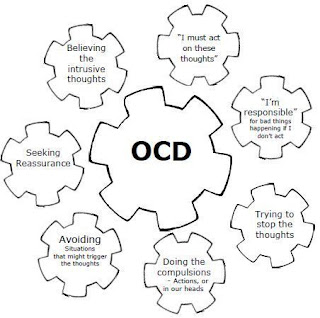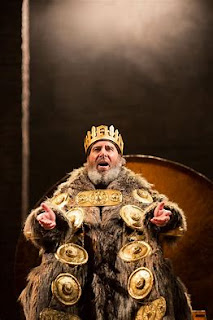The OCD Bully
In my novel, 'Myself am Hell', I started with the idea of three strangers coming together through a prank gone wrong. You know the kind of prank I mean: that time when you're in a queue or a public place and someone comes up and taps the person in front of you on the shoulder and then hides. A brief moment of baffled looking around is followed by the joy of seeing a friend or relative or someone we haven't seen for ages and didn't even know was in the country, etc etc. I wondered what would happen if the tap on the shoulder and hide prank went wrong. What if this simple act had unforeseen consequences for the people involved? I started thinking about the prankster and the victim. And the innocent bystander waiting in the queue who becomes inextricably connected to them through no fault of his own.
I realised quickly that the innocent bystander is a character pushed to the brink of mental collapse by obsessive compulsive disorder. I had not planned to do this; it happened automatically. I began to write in the first person and present the OCD "flashes" - as I call them - as jarring interjections into the flow of my character's thoughts. As someone who has experienced the debilitating effects of OCD, this was clearly as subject I needed to write about and work through. The cognitive behaviour therapy that I found so useful in learning to manage the condition also made me think what an odd condition it is. When a person's mind begins to tell them things that they know are not true or real, it makes them acutely aware of what the term "good mental health" really means. Our mental health is like a forcefield around us that we only ever notice when it starts to malfunction, when the invading forces are able to smash their way through in the form of intrusive thoughts.
Up until the age of eighteen I had always taken my mental health for granted. It was there and it was functioning so I had no cause even to think about it. I started having intrusive thoughts that I had raped and murdered people when I was at university. The discomfort caused by these thoughts led me to perform checking compulsions in the hope of finding irrefutable evidence that I had not done these things. This is where the dark and sadistic (almost) humour of the condition comes in. OCD not only presents a problem, but it also seemingly offers a ready made solution to the discomfort and torment: perform the compulsions. Check, repeat, find the evidence. It took several years for me to realise that the performance of the compulsions solidifies and strengthens the power of the intrusive thoughts over the mind. By dignifying the thoughts with the performance of a compulsion, we trap ourselves in the obsessive-compulsive cycle.
My character Quentin is caught in the grip of this cycle when we meet him at the novel's opening. OCD has tightened its grip on his mind to the extent that he cannot see a way out. The main action of the novel is the battle Quentin fights against OCD and depression. The friends he meets and the places his imagination takes him are the antidote to the tyranny of OCD and depression. I wanted to show Quentin's mind helping him fight the condition just as surely as the intrusive thoughts are attacking him. I know the guilt that comes with OCD and I also know that the condition plays the cruel trick of making sufferers think that the intrusive thoughts somehow represent them or are part of their identity, and that they ought therefore to feel guilty about these thoughts. I want to state unequivocally that the intrusive thoughts do not represent you, they are not part of your personality, and you ought to feel no more guilty about these thoughts than you would for wondering what the weather is going to do tomorrow. One of the many awful effects of mental illness is to make us feel somehow responsible for the illness we are suffering. It's my mind, therefore my fault that I'm not functioning properly. That was my narrative for many years. The internal, personal nature of mental illness made it so hard for me not to blame myself and see my illness as a weakness of character.
It was through CBT that I learned to accept that these thoughts are not me and are not a part of who I am. I show Quentin going through a similar experience as he realises that he does not need to act on the intrusive thoughts, to feel responsible for them, to try to stop them from happening, or to perform compulsions in the name of short-term relief. I did everything named in the little cogs at the top of this post for years. At one point in my book Quentin's doctors refer to the condition as 'the OCD bully'. I think this is apt because without equipping ourselves to fight the bully, to stand up to him in the right way, the bully will make our lives a misery. I want my novel to provide people with an insight into this peculiar condition and to offer hope to anyone currently suffering through the obsession and compulsion cycle.
My name is Henry Wright. I am an English Literature graduate with a love for the works of Milton, Faulkner, Joyce, and McCarthy. I live in Kent with my wife and our two cats. 'Myself am Hell' is my first novel and it is available on Kindle Direct Publishing https://amzn.eu/d/iLOX3de
I am proud to identify as someone who lives with OCD.




Comments
Post a Comment